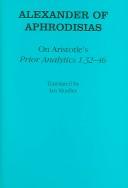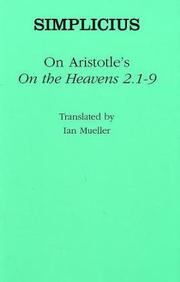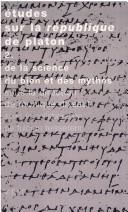| Listing 1 - 10 of 10 |
Sort by
|
Book
ISBN: 0262131633 9780262131636 Year: 1981 Publisher: Cambridge MIT press
Abstract | Keywords | Export | Availability | Bookmark
 Loading...
Loading...Choose an application
- Reference Manager
- EndNote
- RefWorks (Direct export to RefWorks)
Mathematics --- Logic, symbolic and mathematical --- Philosophy --- Euclid --- Logic, Symbolic and mathematical --- -Math --- Science --- Algebra of logic --- Logic, Universal --- Mathematical logic --- Symbolic and mathematical logic --- Symbolic logic --- Algebra, Abstract --- Metamathematics --- Set theory --- Syllogism --- Ėẏklid --- Evklid --- Euclid, --- Uqlīdis --- Euklid --- Eukleidēs --- Euclides --- אוקלידוס --- إقليدس --- -Philosophy --- Logic of mathematics --- Mathematics, Logic of --- Euclid. --- Euclides. --- Mathematics - Philosophy --- Euclid - Elements
Book
ISBN: 0920980511 Year: 1992 Publisher: Alberta Academic printing and publ.
Abstract | Keywords | Export | Availability | Bookmark
 Loading...
Loading...Choose an application
- Reference Manager
- EndNote
- RefWorks (Direct export to RefWorks)

ISBN: 0715634089 9780715634080 0801444950 9780801444951 Year: 2006 Publisher: London Duckworth
Abstract | Keywords | Export | Availability | Bookmark
 Loading...
Loading...Choose an application
- Reference Manager
- EndNote
- RefWorks (Direct export to RefWorks)
Logic --- Logique --- Early works to 1800 --- Ouvrages avant 1800 --- Aristotle. --- Analytica priora (Aristoteles). --- Language and languages --- Language and languages. --- Logic. --- Semantics (Philosophy) --- Semantics (Philosophy). --- Taalfilosofie. --- Philosophy --- Alexander, --- Aristoteles, --- Aristotle --- Sémantique (Philosophie) --- Langage et langues --- Early works to 1800. --- Philosophie
Book
ISBN: 9781472557414 9780715632000 1472557417 0715632000 1472557956 1472557840 9781472557438 9781472557919 9781472557841 9781472557377 1472557379 1472557433 1472557913 9781472558121 1472557859 147255812X 9781472557858 9781472557957 9780715638439 9780715638446 9780725632321 9780715630709 9780715633427 Year: 2014 Publisher: London : Bloomsbury,
Abstract | Keywords | Export | Availability | Bookmark
 Loading...
Loading...Choose an application
- Reference Manager
- EndNote
- RefWorks (Direct export to RefWorks)
"Aristotle believed that the outermost stars are carried round us on a transparent sphere. There are directions in the universe and a preferred direction of rotation. The sun moon and planets are carried on different revolving spheres. The spheres and celestial bodies are composed of an everlasting fifth element, which has none of the ordinary contrary properties like heat and cold which could destroy it, but only the facility for uniform rotation. But this creates problems as to how the heavenly bodies create light, and, in the case of the sun, heat. The topics covered in this part of Simplicius' commentary are the speeds and distances of the stars; that the stars are spherical; why the sun and moon have fewer motions than the other five planets; why the sphere of the fixed stars contains so many stars whereas the other heavenly spheres contain no more than one (Simplicius has a long excursus on planetary theory in his commentary on this chapter); discussion of people's views on the position, motion or rest, shape, and size of the earth; that the earth is a relatively small sphere at rest in the centre of the cosmos."--Bloomsbury Publishing.
Cosmologie antique --- Cosmology, Ancient --- Astronomie antique --- Astronomy, Ancient --- Mécanique céleste --- Celestial mechanics --- Aristote, --- Aristotle --- Cosmology, Ancient. --- Cosmology --- Astronomy --- Aristotle. --- Cosmology. --- De caelo (Aristoteles). --- Studies. --- Contributions in cosmology. --- Cosmologie antique. --- Astronomie antique. --- Mécanique céleste. --- Aristote --- Astronomy, Greek --- Cosmology - Early works to 1800 --- Motion --- Science, Ancient --- Four elements (Philosophy) --- Logic --- Physics --- Astronomy, Ancient. --- Mécanique céleste.
Book
ISBN: 0715633422 9780715633427 Year: 2005 Publisher: London Duckworth
Abstract | Keywords | Export | Availability | Bookmark
 Loading...
Loading...Choose an application
- Reference Manager
- EndNote
- RefWorks (Direct export to RefWorks)
Astronomy, Greek --- Astronomy, Greek. --- Cosmology, Ancient. --- Aristotle. --- De caelo (Aristotle).

ISBN: 0801441021 Year: 2004 Publisher: Ithaca (N.Y.): Cornell university press
Abstract | Keywords | Export | Availability | Bookmark
 Loading...
Loading...Choose an application
- Reference Manager
- EndNote
- RefWorks (Direct export to RefWorks)
Cosmology, Ancient --- Cosmology --- Ancient cosmology --- Aristotle. --- Philosophy of nature --- Aristotle
Book
ISBN: 080144442X Year: 2005 Publisher: Ithaca (N.Y.) Cornell university press
Abstract | Keywords | Export | Availability | Bookmark
 Loading...
Loading...Choose an application
- Reference Manager
- EndNote
- RefWorks (Direct export to RefWorks)
Logic --- Syllogism --- Aristotle.
Book
ISBN: 0691071608 0691214670 9780691214672 9780691071602 Year: 2020 Publisher: Princeton, NJ
Abstract | Keywords | Export | Availability | Bookmark
 Loading...
Loading...Choose an application
- Reference Manager
- EndNote
- RefWorks (Direct export to RefWorks)
The description for this book, Proclus: A Commentary on the First Book of Euclid's Elements, will be forthcoming.
Mathematics, Greek --- Geometry --- Early works to 1800 --- 51 <09> --- Greek mathematics --- Mathematics--Geschiedenis van ... --- Mathematics, Greek. --- Early works to 1800. --- 51 <09> Mathematics--Geschiedenis van ... --- Mathematics--Geschiedenis van .. --- Mathematics--Geschiedenis van . --- Geometry. --- Mathematics --- Euclid's Elements --- Aigeias of Hierapolis. --- Babylonians. --- Diogenes Laertius. --- Eudemus of Rhodes. --- Friedlein, Gottfried. --- Gelon. --- Heron of Alexandria. --- Iamblichus. --- Justinian. --- Leodamas of Thasos. --- Marcus Aurelius. --- Menaechmus. --- Neoclides. --- Neoplatonists. --- Orphic writings. --- Pappus. --- Perseus. --- Philippus of Mende. --- Sceptics. --- Simplicius. --- Syrianus. --- Taylor, Thomas. --- Xenocrates. --- Zenodorus. --- cosmic figures. --- line, definitions of. --- quadratrix. --- reduction. --- tetrad. --- theurgy. --- Mathematics--Geschiedenis van --- Geometry - Early works to 1800 --- Euclides
Book
ISBN: 0715634070 0715628763 9781472557803 9780715634073 9781472557810 9780715628768 1780938810 9781780938813 1472557808 9780715628553 0715634089 1472557816 0715628550 9780715634080 9781472558480 1472558480 Year: 2014 Publisher: London : Bloomsbury,
Abstract | Keywords | Export | Availability | Bookmark
 Loading...
Loading...Choose an application
- Reference Manager
- EndNote
- RefWorks (Direct export to RefWorks)
The commentary of Alexander of Aphrodisias on Aristotle's Prior Analytics 1.8-22 is the main ancient commentary, by the 'greatest' commentator, on the chapters of the Prior Analytics in which Aristotle invented modal logic - the logic of propositions about what is necessary or contingent (possible). In this volume, which covers chapters 1.8-13, Alexander of Aphrodisias reaches the chapter in which Aristotle discusses the notion of contingency. Also included in this volume is Alexander's commentary on that part of Prior Analytics 1.17 which explains the conversion of contingent propositions (the rest of 1.17 is included in the second volume of Mueller's translation). In the second volume, the 'greatest' commentator, Alexander, concludes his discussion of Aristotle's modal logic. In the second half of book 1 of the Prior Analytics, Aristotle reflects on the application of the formalized logic he has developed in the first half, focusing particularly on the non-modal or assertoric syllogistic developed in the first seven chapters. The last 14 chapters of book 1 of Aristotle's "Prior Analytics" are concerned with the representation in the formal language of syllogistic of propositions and arguments expressed in more or less everyday Greek. In his commentary on those chapters, "Alexander of Aphrodisias" explains some of Aristotle's more opaque assertions and discusses post-Aristotelian ideas in semantics and the philosophy of language. In doing so he provides an unusual insight into the way in which these disciplines developed in the Hellenistic era. He also shows a more sophisticated understanding of these fields than Aristotle himself, while remaining a staunch defender of Aristotle's emphasis on meaning as opposed to Stoics concern with verbal formulation. In his commentary on the final chapter of book 1 Alexander offers a thorough discussion of Aristotle's distinction between denying that something is, for example, white and asserting that it is non-white.
Logic --- Syllogism --- Logique --- Syllogisme --- Early works to 1800 --- Ouvrages avant 1800 --- Aristotle. --- Modalité (Logique) --- Modality (Logic) --- Contingency (Philosophy) --- Modalité (Logique) --- Contingence (Philosophie) --- Early works to 1800. --- Semantics (Philosophy) --- Language and languages - Philosophy --- Aristotle --- Aristote, --- Analytica priora (Aristoteles). --- Contingence (Philosophie) - Ouvrages avant 1800. --- Contingency (Philosophy) - Early works to 1800. --- Déduction (Logique) - Ouvrages avant 1800. --- Modality (Logic) - Early works to 1800. --- Modalité (Logique) - Ouvrages avant 1800. --- Rezeption. --- Syllogismen. --- Alexander, --- Aristoteles, --- Aristote / Premiers analytiques. --- Aristotle <384-322 B.C> / Prior analytics. --- Modality (Logic). --- Syllogism. --- Prior analytics (Aristotle). --- Language and languages


ISBN: 2345001747 2711618161 Year: 2021 Publisher: Paris : Vrin,
Abstract | Keywords | Export | Availability | Bookmark
 Loading...
Loading...Choose an application
- Reference Manager
- EndNote
- RefWorks (Direct export to RefWorks)
« Même si elle tient à la fois de la poésie et du sermon, la République est avant tout un livre de philosophie. » Et Nettleship, un de ses plus grands interprètes, énonçait en conséquence ce principe de lecture : il faut voir comment Platon arrive à ses conclusions avant de commencer à les critiquer. Pour les critiques, elles n’ont jamais manqué, que ce soit envers la nature utopique ou totalitaire qu’on reconnaît à l’œuvre, ou à l’égard de thèses métaphysiques ou politiques jugées exorbitantes, tel ce mystérieux « bien par delà l’essence » ou celle du gouvernement des philosophes. Ce second volume a pour objet les principes dégagés par les livres centraux, fondements nécessaires des conséquences psychologiques et politiques tirées dans les autres livres. La définition du philosophe authenthique, seul apte à saisir le Bien par la science qui lui est propre, permet de constituer en paroles une cité ayant pour modèle l’Idée même de justice et de définir comme une conversion totale de l’âme l’éducation de ceux qui sont destinés à la garder et à la gouverner. Enfin, si c’est dans la République que la plus haute science, la dialectique, se trouve déterminée par le fait de n’avoir pas recours à des images, l’œuvre abonde en comparaisons, allégories, analogies et mythes en tous genres. Nouer ainsi la science au mythe, c’est sans doute aussi réfléchir à une des manières dont la philosophie doit pénétrer la politique.
Classics --- Philosophy --- politique --- mythe --- science --- République --- bien --- dialectique
| Listing 1 - 10 of 10 |
Sort by
|

 Search
Search Feedback
Feedback About UniCat
About UniCat  Help
Help News
News